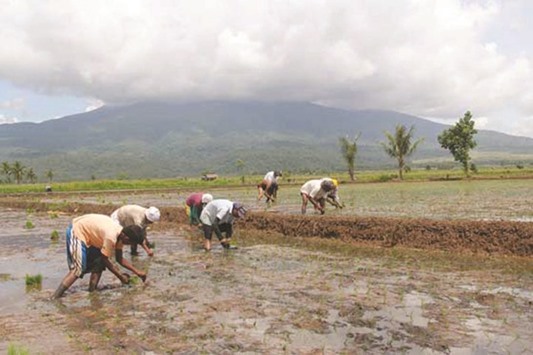Bicolano farmers have developed “climate-smart” farming practices to attain food sufficiency even with year-round natural calamities, Department of Agriculture Regional (DA) Director Elene delos Santos in Bicol told Manila Times recently.
Such practices, delos Santos said, made the US Agency for International Development (USAID) pick Bicol as priority area for project development in the country.
“Bicolano farmers have an edge when it comes to coping with extreme climate. In fact, our farmers are ranked first for climate-smart resiliency. Because of this remarkable adaptation of the Bicolano farmers, the Bicol Region was chosen by the USAID as priority area for development projects,” she told a media briefing held at DA regional office in Pili over the weekend.
Four of the more than 20 typhoons that struck the Philippines last year battered Bicol along with constant flooding and volcanic eruptions that affected agricultural crops in the region.
In the first quarter of 2016, Bicol ranked third in palay production with 8.39% share in national production based on data shown by delos Santos.
The region is one of the country’s biggest agricultural areas wherein rice and corn are the major banner crops.
With climate-smart farming practices of the Bicolano farmers, Bicol is emerging as the agricultural giant of the country, delos Santos said.
To fight climate change, farmers instituted utilisation of high-quality seeds to minimise losses brought by extreme weather conditions.
The Agriculture department has pitched in by providing affordable agricultural machinery without or with minimal farmer’s equity.
The department also worked with the Philippine Statistics Authority (PSA) to ensure updated and accurate production data particularly on effects of climate change.
Emily Bordado, DA regional spokesman, said implementation of the so-called HYTA techno demonstration project in major rice-producing municipalities has encouraged rice farmers to shift from certified seeds to hybrid seeds.
“The successful conduct of the national rice techno forum in a
20-hectare compact techno demo of hybrid rice in Albay showed that rice sufficiency could be attained through hybrid technology,” Bordado noted.
Currently, the DA regional office maintains 206 active local farmer technicians to augment technical support of local government units to rice farmers. “Part of farmers adaptation is the planting of the green super rice variety as tested in Bicol specifically in water-saline and flood-zone areas of the region like in the Bicol River area,” Bordado said.
In corn production, Bicol ranked eighth in yellow corn output with 188,436 metric tonnes and 10th in white corn with 55,422 MT based on PSA data.
“Rehabilitation of damaged rice farms due to the El Nino phenomenon through a buffer stock programme has been done as well as precision fertilisation and soil amelioration to help boost productivity of rice farms,” Bordado said.
The Agriculture department’s interventions to help farmers adapt to the changing climate like conducting training on use of post-harvest equipment facility have helped revive the Philippines-Spain cassava project in Camarines Sur and Masbate provinces.
The region has allocated a total of 23,209 hectares for organic farming.
Distribution of 12 composting facilities to 12 organisations has resulted in the conversion of almost 300 hectares to organic farming.

The Department of Agriculture in Bicol has cited the local farmers for easily adapting to extreme climate changes.
